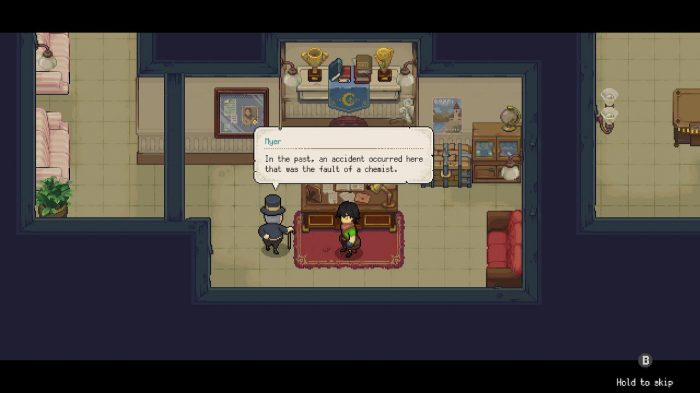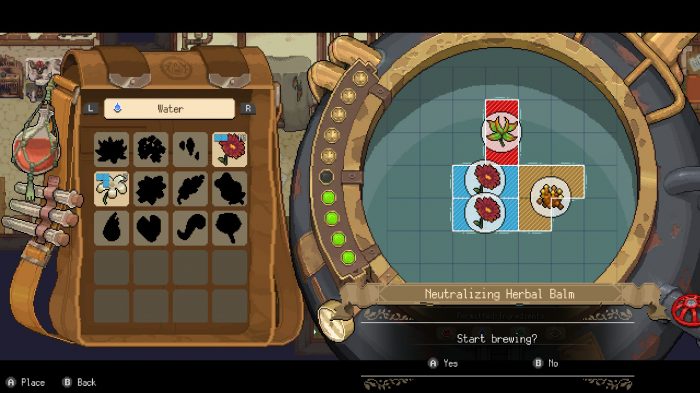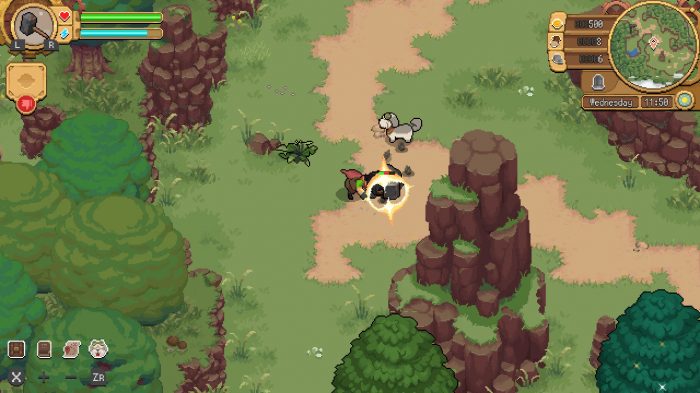Between the many trends happening at this moment within the indie scene, there’s hardly a more prominent style of experience than so-called wholesome games.
While these types of indie games are not necessarily locked to a single gameplay style or even a unique gaming genre, they are more often than not focused on certain laid-back structures such as the ones found in farming sims or some RPGs. Mixing elements from these two genres, Potion Permit is MassHive Media’s own interpretation of this kind of game — an interesting (albeit flawed) sim game where you adopt a pivotal role in the revival of a community.

The starting segment of Potion Permit is very unique when compared to some of the most famous wholesome games. You will find similarities to games such as Stardew Valley or Graveyard Keeper, in the sense that you are also a foreigner that is being introduced to a new small, and (apparently) peaceful community. However, differing from those games, the residents of Potion Permit’s Moonbury village are extremely hostile to your presence – at least at first. As you quickly learn, the previous chemist that lived in Moonbury was responsible for some kind of disaster, leaving behind multiple problems that still persist. As the newly appointed chemist, it is up to you to find a solution to these problems, all while you try to offer help to Moonbury’s residents with your potions and chemist knowledge.
Within that premise, Potion Permit presents its most unique systems, as well as its overall gameplay loop. Like other sim games, the most important factor to your success will be related to how you choose to spend your limited time in Moonbury village. Helping sick villagers, talking to people to increase your friendship, and foraging for new material are just a few of the many tasks that you will need to manage within the time-limited game structure. As ever in these games, jumping from task to task is what keeps the game fresh, but Potion Permit has some very unique features that differentiate it from others.

As the title implies, developing and brewing different potions is one of the focuses of Potion Permit. For that, the game presents a very interesting puzzle-like structure, where you need to fill a grid with ingredients of the correct element. Basically, every single material will have a unique property (being categorized as fire, water, earth, or wind), as well as a different format. In the beginning, your caldron also has a very strict limit on how many ingredients you can fill, so you will constantly need to juggle the different ingredients in order to make the potions needed for each situation.
As a chemist, though, you are not only a potion specialist, you also work as a kind of doctor for Moonbury. Every time someone gets sick, they will be taken to your clinic, where you must examine them in order to identify what they have, and what is the correct treatment. During these moments, you will need to complete some very simple mini-games that can take two forms: a short rhythm game where you must press the correct prompt, or a memory game. These mini-games aren’t necessarily good or interesting per se, but they at least add some flavor to the examination process.

As ever with these games, as you get to know people better, you will unlock different scenes where you get to learn more about each Moonbury inhabitant — and these are some of the best moments in Potion Permit. These unique personal stories are always entertaining, ranging from comic interludes to poignant segments about people’s frustrations and dreams. It was thanks to the quality of the writing that Potion Permit kept me hooked through dozens of hours despite its more problematic aspects.
You see, in order to complete these personal quests, develop new potions, or even upgrade your clinic, cauldron, and equipment, you need to gather the correct materials. To do so, Potion Permit contains an entire explorable region that is teeming with a variety of trees, rocks, plants, and monsters as well. Nothing too different to your everyday sim game, right?

The problem lies in the absurd amount of materials that some activities in Potion Permit require from you. Instead of creating a natural loop where you are going back-and-forth between the village and the wilderness, collecting enough material for your current task, the game demands an irrational amount of grinding. Want to upgrade your hammer or unlock a new area? Well then, good luck spending a few days mindlessly gathering materials. It’s a true shame.
In addition to that, Potion Permit also has a few annoying random bugs that can totally break your progress. Getting stuck in a menu or a level isn’t funny when the only solution is restarting the game and losing all the progress for that day.
Despite those issues, Potion Permit still has lots to offer with its beautiful pixel art style and great writing. With some balancing and bug fixes, it may eventually brew into the great game it can be.
Potion Permit £16.99
Summary
With its unique take on the sim genre, Potion Permit offers some great moments thanks to its well-written characters. Unfortunately, some exaggerated grinding and nasty bugs get in the way of its best segments.

